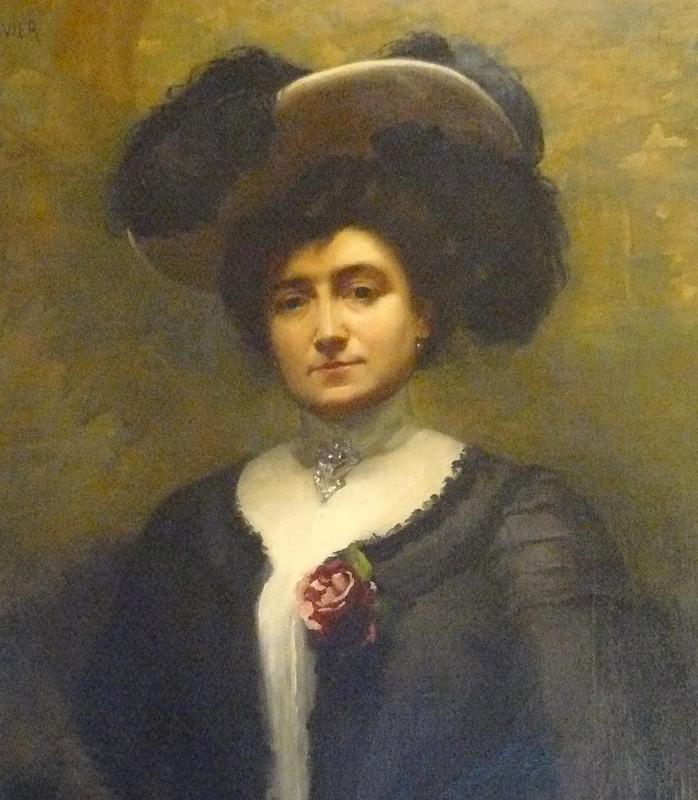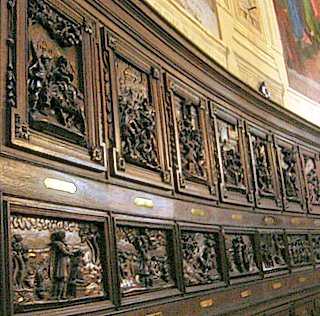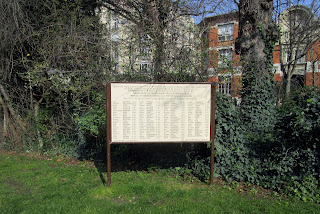We were fortunate and had my brother John and his wife Melanie stay with us for a day before
flying off to Macedonia via Istanbul. Here he is working online. He is a professor
and the semester is still in progress. Luckily they are coming back to Paris at the end of March.

Taking a walk around the block
On the Champs de Mars
Notice the Ecole Militaire (military school) right behind me. It is actually on
the other side of the street.
Musee Cognacq-Jay
Another one of those delightful museums own by the city that do not charge to
see their permanent exhibits. Temporary ones have a fee. This one was 8 Euros
for an adult ticket. We stuck to the permanent exhibits.
Courtyard

The small desk is referred to as the mechanical desk. My French is not good enough to
read why and no one was willing to let me tinker with it to find our if it
really was mechanical.
Each room was a different color and decorated differently. The art and the furnishings are
all from the 18th Century.
Au cœur du Marais, dans un bel hôtel classé monument historique, le musée présente les collections d’art réunies par Ernest Cognacq, fondateur des magasins de la Samaritaine, et sa femme Marie-Louise Jay, léguées à la Ville de Paris en 1928.
My French is totally inadequate but this does tell me that Ernest Cognacq whose home
this is and who collected art during his life time, was the founder of the huge department
store Samaritaine. Unfortunately it no longer is in business.

Young girl by Jean Baptiste Le Moyne

Seated Venus
Jean-Pierre Antoine Tassaert (1727-1788)”

Marie-Louise-Elisabeth Vigée-Lebrun (1755-1842), Portrait de Marie-Louise de Robien.
The art is soft and gentle. Perhaps romantic would describe it. For me it holds a great appeal.
It was during this era that ordinary people began to have their portraits painted.
All of the women and children are beautiful.

Jean-Baptiste Greuze (1725-1805), Petit garçon au gilet rouge
Boy with in a red vestAlain Truong

by Johann-Joachim Kaendler (1706-1775)
The housewife writing in the account book
Portrait of Ernest Cognacq by Jeanne Madeleine Favier
Marie-Louise Jay by Favier
Both paintings in oil were done in 1903

I want to thank Andre Trong for the use of some of his photographs.
When we left the museum we saw this long line of people patiently waiting.
When we went around the dorner
Embassy of Axerbijan
If you look closely you will see that this baker is working on the other side of a window behind the cash register. He is laying out loaves of bread ready to go into the oven.
I am a little, just a little embarrassed to admit that we did not seek out this 1st prize winning
boulangerie. It just happened to be there when I started to feel as if it was time to eat something.
We bought three ordinary pastries. That were extraordinarily good.
Pain au chocolat and chaussons aux pommes and a pain aux raisin.
An open area by or part of the Place de la Republique
,_r%C3%A9am%C3%A9nagement,_2013-06-14_18.jpg/260px-Place_de_la_R%C3%A9publique_(Paris),_r%C3%A9am%C3%A9nagement,_2013-06-14_18.jpg)
Since 2013, after refurbishment, the central part of the Place de la Republique is named after leader André Tollet (Paris, July 1, 1913 - Paris, 14 December 2001).
This line was forming very close to the museum we had just been at. We went around
the corner and encountered another roped off line and part way down the block on
the other side of the street was a third group of people waiting in a roped off area. Mostly
under thirties group. When we got home I search and search to try to figure out what was
so interesting that all of these people were patiently stand in line. We discovered that
a new exhibit is opening today at the galerie de Thorigny. It is the works of Jerome Romain.

Just in case you do not want to check out the link that solved the mystery for us.

Meanwhile at another galerie:
It was noon and we saw a man come out of the gallery and lock the door.
Probably he was going to lunch.
Because of his departure, we were unable to go into the gallery and
see what gems he had to offer besides this - is it a camel?
Old Metro sign at the Arts et Metiers entrance
Place de la Republique
Les fleurs de la République, un mémorial spontané
In memory of the victims of the assaults on Parisians in November 2015.
It now has a metal fence or barrier around it to protect the signs and tributes there.

Turkish food in the Marais district
Say yes to the dress. The reflection of the buildings opposite the shop are easier to see than
the dresses in the window.
Obviously the clients are treated like royalty. The shop was either not open
or not a busy business.
This is a statue of a man named Pierre-Jean Beranger
He was a poet and writer of popular songs in the late 18th century and the early 19th.
He was a very appropriate addition to our visit to the 18th century musee Cognacq-Jay.
Square du Temple
A bush in bloom. Spring must be on its way.
The bas relief on the building looks as it is of the birth of Venus. Any other suggestions.


Sainte Marie Elisabeth de Hongrie
At noon we heard the bells of a church ringing. We really could not tell which direction the sound
was coming from. As we walked further we could see a bell tower off to our right. It is one of
those city churches that is tucked between buildings and almost impossible to get a picture of.
.

The red pennants are a symbol of the Knights of Malta. They are displayed inside also.
Church of Sainte Elisabeth :
This former convent chapel was dedicated to Saint Elizabeth of Hungary in 1646. The visitor should not miss this opportunity to go in to see the hundred small Flemish bas-reliefs from the 17C, placed around the ambulatory and coming from the former abbey of Saint-Vaast d'Arras. It is nowadays the church of the Knights of Malta.




















































No comments:
Post a Comment